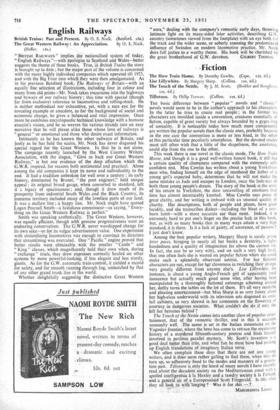English Railways
British Trains: Past and Present. By 0. S. Nock. (Batsford. t6s.) The Great Western Railway: An Appreciation. By 0. S. Nock. (Helfer. 18s.) " Barrtsit RAILWAYS " implies the nationalised system of today. "English Railways "—with apologies to Scotland and Wales—better suggests the theme of these books. True, in British Trains the story is brought up to date ; but the major part of the volume is concerned with the many highly individual companies which operated till 1923, and with the Big Four into which they were then amalgamated. As in his previous Batsford book, The Railways of Britain—with an equally fine selection of illustrations, including four in colour and many from old prints—Mr. Nock takes excursions into the highways and byways of our railway history ; this time with special (though far from exclusive) reference to locomotives and rolling-stock. He is neither methodical nor exhaustive, yet, with a sure eye_for the revealing example or anecdote, as for the background of social and economic change, he gives a balanced and vital impression. Once more he combines encyclopaedic technical knowledge with a humane essayist's vision, and he so weaves his various strands into an easy narrative that he will please alike those whose love of railways is " general " or emotional and those who desire exact information.
Intimately as lie has known the other railways- of Britain; and justly as he has held the scales, Mr. Nock has never disguised his special regard for the Great Western. In that he is not alone. The campaign recently launched by the West Country Writers' Association, with the slogan, " Give us back our Great Western Railway," is but one evidence of the deep affection which the G.W.R. inspired, for reasons both sentimental and practical. Alone among the old companies it kept its name and individuality to the end. It had a tradition unbroken for well over a century ; its early history, dominated by Brunel, " the poet engineer," held unique appeal ; its original broad gauge, when converted to standard, left it a legacy of spaciousness ; and, though it drew much of its prosperity from industrial South Wales and the Black Country, its immense territory included many of the loveliest parts of our land. It was a mellow line ; a happy line. Mr. Nock might have quoted Logan Pearsall Smith—a fastidious connoisseur—as saying, " Every- thing on the Great Western Railway is perfect."
Smith was speaking aesthetically. The Great Western, however, was equally efficient, though with gen'uine progressiveness went an endearing conservatism. The G.W.R. never worshipped change for its own sake—or for its vulgar advertisement value. One experiment with streamlining 'locomotives was enough to convince its directors that streamlining was overrated. One.".Pacific " engine proved that better_ results were • obtainable, with the smaller " Castle " and " King " classes, which magnificently held their own when, during " exchange " trials, they drew expresses normally hauled on other systems by more powerful-looking, if less elegant and less sturdy, giants. As for the G.W. automatic train-control, it yielded a record for safety, and for smooth running through fog, unmatched by that of any other grand trunk line in the world.
Whether delightfully suggesting the distinctive Great Western
"aura," -dealing with the company's romantic early days, throwing intimate light on its many-sided later activities, describing G.W. country (sometimes viewed from the footplate) with an eye both for the track and the wider scene, or soberly assessing the predominant influence of Swindon on modern locomotive practice, Mr. Nock does full justice to a worthy theme. His book will be cherished by
the great brotherhood of G.W. devotees. GILBERT THOMAS.


































 Previous page
Previous page